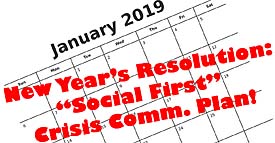


Resolved for 2019: Overhaul Your Crisis Communication Plan So It’s “Social First”
[by Howard Fencl, Hennes Communications] This may be a shocker, but you knew it was coming: More Americans now get news from social media than from print. I’ll say that again: More Americans now get their news from social media than from newspapers. That’s according to a new report out by the Pew Research Center.
Today, news frequently breaks on social media first – before print, before TV, before radio. The difference, of course, is that when there’s ugly news about your organization hitting social platforms, it can quickly spiral out of control and go viral before you can dig up your crisis communications plan and draft a response. You’ve already missed the first wave of news coverage. And if you’re not on the record in that first wave, you’re behind the crisis 8-ball. You’ll be playing catch-up getting your side of the story out and defending your reputation.
The immediate ramification for your organization in light of the new Pew Report: If you have a crisis communications plan, update it in 2019 so it’s a “social first” plan. Your plan should tick off a dozen or so of the nightmare scenarios that keep you and your leadership team awake at night. It should include drafts of initial social media posts, media statements and internal emails written, approved and ready to go for each scenario – assuring that your voice will be part of those crucial first reports.
Ignoring the ascendance of social media as a news source can have deep, lingering impact on your company’s reputation – its most valuable uninsured asset. Why? Because social media is still littered with fake news.
The social platforms say they’re cracking down on fake news, but that may be lip service:
- Former Facebook fact checkers – whose job it is to root out fake news – have told reporters they don’t trust Facebook and that the platform “ignored their concerns and failed to use their expertise to combat misinformation.” A current Facebook fact checker said “Why should we trust Facebook when it’s pushing the same rumors that its own fact checkers are calling fake news?”
- A Knight Foundation report studied more than 10 million tweets from 700,000 Twitter accounts that linked to around 600 fake and conspiracy news outlets. The study found that more than 80% of those disinformation accounts active prior to the 2016 presidential election are still active today. And those accounts are still publishing more than a million tweets every day.
You most definitely do not want to wake up one morning to find that the fake news du jour is about you. If you have a crisis comm plan, update it and be sure it’s “social first.” If you don’t have a crisis comm plan, time to get started. Call us, and we’re glad to help. It may be the best reputation investment you make in 2019, and don’t we all want to sleep well in the New Year?